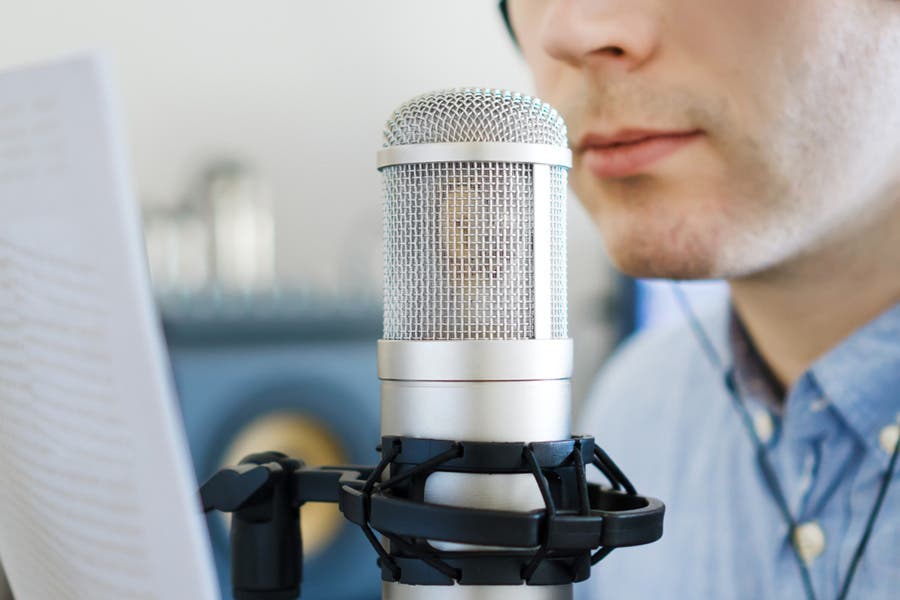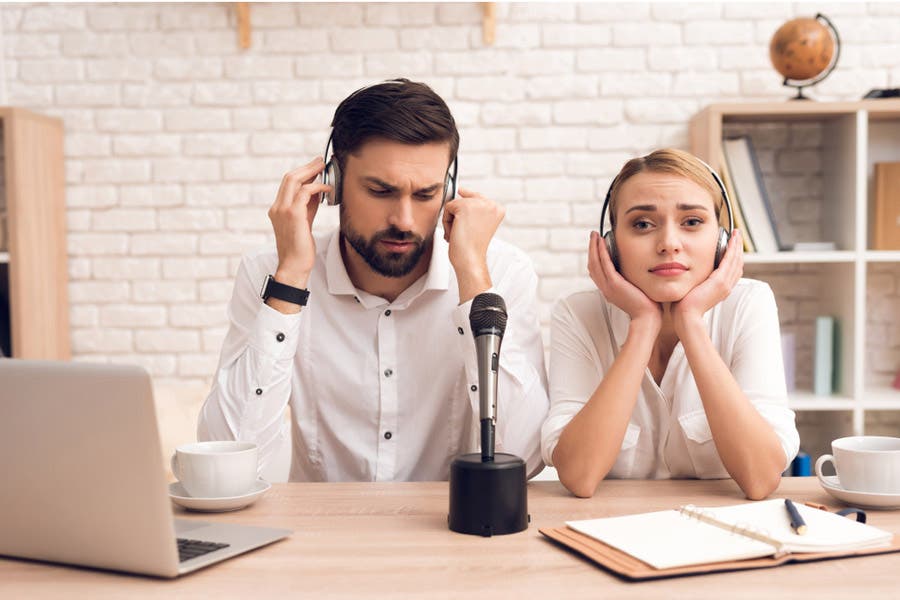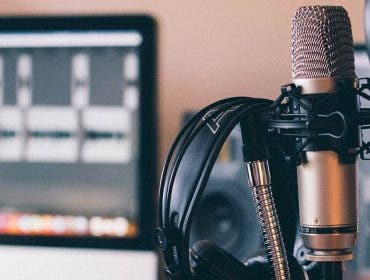Are you planning to start your own podcast? Before you think of a name for your show and what topics you should talk about, you’ll first need to determine the kind of show it should be. There are many popular types of podcasts and formats aside from interviews and solo commentaries, and knowing more about each of them will give you more options for creating a unique and interesting podcast.
Types of Podcasts & Genres
While comedy and news are the two most popular types of podcasts, there are over a dozen different types of podcasts with big-time listenership. These include fiction and non-fiction storytelling (narrative drama), health and wellness, self-help, politics, investigative journalism, pop culture, religion, sports, true crime, game shows, history, technology, art, music, culture, and more. The goal of defining your podcast’s genre is to not only narrow your focus and keep the show topical, but also to increase its discoverability by new listeners.
Here’s a quick breakdown of the most popular types of podcasts:
- Comedy: The primary purpose is to make people laugh. Often includes humorous storytelling, fictional comedic “bits,” and/or open conversation.
- News: Usually topic-based, and informs listeners of local and/or global news.
- Pop Culture: An open-ended genre. Can discuss anything from film and television to art, video games, music, and more.
- True Crime: Usually an episodic series depicting stories of notorious criminals and their activity.
- Narrative Drama: Like true crime, this genre tells a real or fictional story over the course of a “season.”
Many times a show incorporates elements from multiple genres, and sometimes includes more than one podcast format (how the show is organized/presented). After you’ve selected a genre, the most important element of the show is the podcast format. A comedy show, for example, might include interview, monologue, and conversational co-hosting podcast formats from episode to episode. Other types of podcasts are stricter and adhere to a singular style throughout. The monologue or co-hosting podcast format is probably the easiest to get started by yourself or with a small group of friends.
It’s important to familiarize yourself with the top podcasting genres. Once you do, you have the ability to mix-and-match and create something unique to you and your interests, your strengths, and what you want to contribute to the format.
Most Popular Podcast Formats

Choosing the right podcast format that allows you to provide the most value to your audience is critical to creating an interesting, entertaining, and successful show. To help you select the right one for you, we’ve listed some of the most popular types of podcasts below.
One-on-One Interview
Interview shows are definitely the most common podcast format. It involves just one podcast interviewer—that’s you—and an interviewee. It can be anybody you want, like a friend who’s particularly knowledgeable about a certain topic, an expert, or even a celebrity (if you can get ahold of them).
The interview format is pretty straightforward. You can just prepare a bunch of questions and go through them one by one, or you can be more relaxed about it and prepare a general outline of what you want to talk about and just let things flow.
One-on-one interviews are relatively easy to do (especially compared to group interviews where you’ll have to deal with multiple people talking at once), plus minimal editing is needed once you get the conversation going.
Of course, you’ll need at least one extra podcasting microphone, and probably an extra pair of podcasting headphones, for your live interviewee. Or, you can conduct the interview over Skype or Google Hangouts if you live far away or can’t find a convenient schedule, as long as you both have speedy internet connections.
| Advantages | Disadvantages |
| Easy to do | Scheduling can be tricky |
| You won’t run out of things to say | Having to conduct interviews over the internet |
| No strict interview format | |
| Minimal editing required |
Solo Commentary
Many podcasters start out doing solo casts. After all, it’s really the easiest way to get the show on the road. You can treat your podcast as your very own radio show where you can talk about anything that interests you and allow your audience to get to know you better.
There can never be a shortage of topics for a solo podcaster, but it can be hard to keep up the flow on your own. The trick is to write down your script or create a guide so you don’t end up with dead air or silly adlibs. But when you actually read or follow them, make sure you speak conversationally, or else your audiences will be able to tell that you’re reading.
| Advantages | Disadvantages |
| Convenient | No one to bounce off of, so you’re likely to end up with some dead air |
| You won’t run out of topics | |
| You’ll build a more personal relationship with your audience |
Panel (Group Discussion)
Another popular format is the panel or group discussion. It involves multiple hosts, much like a brigade podcast where you can all talk about a particular topic conversationally or you can interview them all at the same time.
Due to the number of speakers involved, it can be very time-consuming (but nobody would be complaining!) and you’ll need to have a good podcast mixer (aside from all the extra microphones) to be able to record all of your audio.
It is also expected to be much, much more difficult to get everybody together for an interview, but the payoff may be worth it if you’re planning to offer great entertainment or very valuable takeaways for your audience.
| Advantages | Disadvantages |
| More people, more input | Technically more difficult to record |
| Great opportunity to offer valuable and entertaining content | Scheduling is more challenging |
| Easy to produce supplemental content for learning | Can be chaotic and/or confusing |
| Time might be too limited to give everyone a chance to speak and get more in-depth about a topic |
Fictional Storytelling
Audiences have taken quite an interest in the types of podcasts that are similar to audiobooks. In this podcast format, writers-slash-casters are given the chance to freely (and dramatically) read out their own fictional stories. This is why it’s also referred to as podcast theater.
Alternatively, you can do a series about a particular novelist’s book series and read them on your own or featuring other “stars.” You don’t necessarily have to be a fiction writer—if you’re interested and knowledgeable about theater and short films, you should be able to do podcast theater. For many creatives, it’s the perfect way for them to explore podcasting and express their interest in fictional stories all at the same time.
If you’re going for fictional storytelling, remember that you’ll need a lot of sound effects and music, so you’ll definitely have to brush up on how to use a good recording and editing software.
| Advantages | Disadvantages |
| There aren’t too many fictional storytellers in podcasting (yet) | Not a common choice for new listeners |
| Can be very addicting for audiences | Takes a lot of work, especially for fictional writers |
Non-Fictional Storytelling
Non-fictional storytelling types of podcasts are essentially about real-life stories. It can be about a different story per episode or an entire series dedicated to something that can keep your audiences at the edge of their seats, like an in-depth crime investigation or a compelling science-based story.
This type of podcast can be very interesting for both podcasters and audiences who like journalism, mystery, learning about new things, and are generally curious about the world. While the research—and putting together an informative hour-long show complete with supporting audio clips from actual interviews—can require a lot of editing and non-editing work, you will be able to create an incredibly valuable and unforgettable podcast.
| Advantages | Disadvantages |
| Can be highly addictive for audiences | Laborious and time-consuming |
| A lot of creative freedom in editing and production | Not beginner-friendly |
| Gives opportunities for advocacy | Harder to produce shows on a regular basis |
Repurposed Content
When you run out of podcast topics, repurposing content is a great way to come up with new material in a pinch. If you’re already sharing content online as a blogger or YouTuber, or if your profession requires you to create lectures and presentations, why not repurpose your work by sharing it with another type of audience—and in a different format?
Or, you can take a handful of old episodes you’ve done before and consolidate them into one episode. For example, if you do a lot of dating-related storytimes on your show, you can do a roundup of your “Top 10 Worst Dates of All Time”—which would contain summarized and rehashed versions of your old stories.
You can also repurpose content from other sources, like an infographic or case study you saw online. Just make sure that you aren’t breaking any copyright laws.
| Advantages | Disadvantages |
| Wide range of topic ideas for podcasts | Lack of thematic consistency |
| Interest is pretty much guaranteed | No specific audience niche |
Mixed Format
While its more ideal to choose a specific format for your show (we’ll explain why below), many podcasters try out different forms alternatively or at the same time. Like many lengthy radio shows, you can have distinct segments. Perhaps you can kick off the show with a solo commentary and then move on to interviews or a panel discussion for the main meat of your show.
Instead of having an audio-only podcast, consider recording a video podcast that your audiences can subscribe to as premium content. This can also be a good way to make money from your podcast.
| Advantages | Disadvantages |
| Makes for a more exciting show | Some significant planning and editing involved |
| Gives you an opportunity to try out other formats without committing any single one | Unpredictability can turn off listeners |
Why should I choose a podcast format?

If you ask the podcasters with long-running shows about secrets behind their success, most of them will answer that it’s their growing audience. And if you’re looking to increase your following, it’s important that you remain consistent—in the topics you talk about, the frequency of your publications, and of course, your format.
Just as it is with TV shows and YouTube channels, audiences will subscribe and get hooked on your show when they like what they hear and when they know that they can expect more of the same thing: more entertainment, interesting stories, real-life reports, dramatic readings, and more.
Another benefit is it will be easier for them to talk about and describe your show to others. As for you, it will also be much easier to come up with a fitting topic or type of content that will be relevant to your market every week.
So as you envision the kind of podcast you want to submit to iTunes, choose a format that you and your audiences will love throughout the entire run of your show.
How to choose a podcast category
The easiest way to choose a podcast category is to pick something you enjoy. If you love music and video games, try a pop culture podcast — throw elements of news in there by dedicating special episodes to brand new releases. Or, if you’re really into health and fitness, start a show educating listeners on exercise, diet, and all things health-related. If you have a naturally funny group of friends, try your hand at a comedy podcast focused on humorous conversations and stories. There isn’t one way to pick a podcast genre, but you should definitely stick with something you’re interested in and willing to dedicate your time and attention to.
It might also help to think about the shows you subscribe to and take certain cues from their genre and podcast format. In terms of choosing a format specifically, try to find the most coherent and entertaining way to present the information to listeners. A monologue is easy to get going on your own, but it might be lacking something with no one else to bounce ideas with. An interview-style show is very focused, though you might find it challenging to find new guests each episode. Each format has its pros and cons. Above all, you should prioritize doing something that’s a ton of fun to make!






